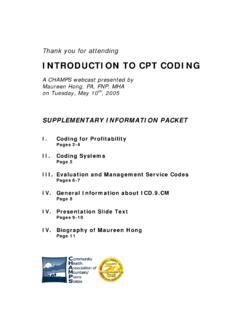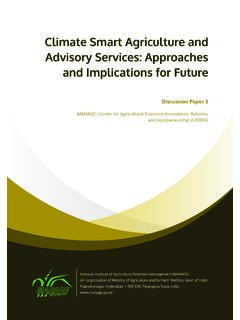Transcription of Role of Advisory Committee - CHAMPS Online
1 1 Role of Advisory Committee An Advisory Committee is a collection of individuals who bring unique knowledge and skills which augment the knowledge and skills of the formal board of directors in order to more effectively guide the organization. The Advisory Committee does not have formal authority to govern the organization, that is, the Advisory Committee cannot issue directives which must be followed. Rather, the Advisory Committee serves to make recommendations and/or provide key information and materials to the board of directors. The Advisory Committee plays an important public relations role as well as providing program staff with a fresh perspective on programmatic issues.
2 A properly composed and structured Advisory Committee can be a tremendous complement to the effectiveness of the board of directors as it works to carry out a specific initiative. Since the board of directors has ultimate governance authority for the organization, the Advisory Committee is able to focus narrowly on a specific program in order to advise or support the organization. The Advisory Committee may evaluate the performance of a program, review/monitor/assess a specific program, serve as advocate for the organization to the community it serves, gather input from/serve as a liaison with relevant constituencies, provide feedback to the organization from the community, provide technical expertise, provide an independent/unbiased sounding board, and assist staff in determining important activities.
3 Other possible responsibilities of an Advisory Committee include determining mission and purpose of a program, articulating the goals, means, and primary constituents to be served by a program, ensuring effective planning, monitoring and strengthening of programs and services, ensuring adequate financial resources, and enhancing the organization s public standing. Effective Advisory committees have terms of service where members are appointed to a specific term and oftentimes there are also term limits. It is also important to ensure the Advisory Committee has a clear purpose and guidelines for membership. How the Advisory group contributes knowledge/skills to the larger board of directors should also be formalized as well as how it interacts with the board of directors and members.
4 Advisory committees benefit from having policies similar to those of a governing board of directors for example: meeting attendance, decision-making, conflict of interest, and ethics policies. A written description of the role and responsibility of Advisory Committee members is also critical. Advisory committees need a sufficient range of expertise to accomplish the organization s mission. 2 SAMPLE Advisory Committee Responsibilities Advisory committees do not have any legal authority; therefore all of their responsibilities are assigned at the discretion of the executive director and/or board of directors. Responsibilities assigned to an Advisory Committee may include any or all of the following.
5 Program Creation and Planning. It can be beneficial to create an Advisory Committee during the early stages of developing a program so that Committee members can provide advice concerning the design and plans for the program. It is easiest to begin with a small Advisory Committee , for example, four to seven community leaders and community members, during the planning process. Development of Program Policy. While Advisory committees cannot create legally binding policies for the organization, they can help create policies which provide direction and support for the program staff. Planning and Implementing Public Relations.
6 An Advisory Committee which includes influential community leaders can be effective at spreading the word about program services. Funding Leadership. Often Advisory committees are created specifically to raise program funds. The Advisory Committee must be granted this authority by the executive director or the board of directors. Individuals committed to the organization with the influence to leverage resources will be most successful. Subcommittees. The Advisory Committee may develop subcommittees which have assigned tasks in specific areas. For example, a public awareness subcommittee composed of four members may be responsible for making recommendations about public awareness strategies and resources.
7 Subcommittees may be short-lived according to a specific assignment or ongoing. Other Tasks. Advisory committees can be created to address a specific organizational need. These Advisory committees are usually short-lived and are disbanded as soon as their specific goals are met.









